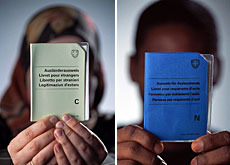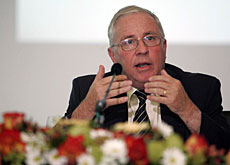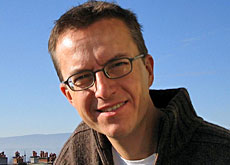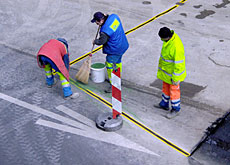Xenophobic Swiss want more integration

More than half of the Swiss population are xenophobic, according to a survey designed to allow the country to compare itself with the rest of Europe.
The study, which measures the development of xenophobic attitudes and rightwing extremism, also revealed that 77 per cent of those tested want foreigners to be better integrated.
Up to seven per cent find rightwing behaviour attractive, while 90 per cent reject it.
Michele Galizia, head of the anti-racism unit of the interior ministry, welcomed the study, which was conducted by Geneva University with the support of the Swiss National Science Foundation.
“We had no data on rightwing extremism and had to rely on media surveys. Now we can finally face our European colleagues and even the United Nations Council on Human Rights,” Galizia said.
Are the Swiss more or less xenophobic than their neighbours?
“Like for everything else, they are in the middle,” said Simone Prodolliet of the Federal Foreigners Commission.
After 3,000 interviews, professor Sandro Cattacin’s team divided 85 per cent of the Swiss and non-Swiss population into four categories.
There was the “creative class” accounting for 37 per cent, who were tolerant in the face of difference and opposed to violence and intolerance. Politically leaning towards the left, its members were urban, cultured and likely to be young.
Conservatives
Xenophobic and misanthropist attitudes dominated the “conservative nationalists” (23 per cent). Politically to the right, they were less cultured and worried about the future. When dealing with society, they wanted order and would recourse to violence.
“Liberal business people” (16 per cent) were scared of foreigners but accepted differences and were not misanthropist. They were in favour of justice and order, leaned towards the right and believed in the market economy.
Finally, many “disorientated traditionalists” (nine per cent) held xenophobic and misanthropist views but their members were not politically active, were scared of the future and could imagine using violence as a means to an end.
According to Cattacin, this last group posed a problem because they consisted of people who are often cut off from society.
Furthermore, 23 per cent admitted to being anti-Semitic, which Cattacin says is a result of criticism of Switzerland’s handling of the dormant accounts held by victims of the Holocaust era but also a reflection of the current political situation in the Middle East.
Paradox
While half the interviewees could be termed as xenophobic, 77 per cent wanted foreigners to be better integrated and 55 per cent wanted naturalisation to be eased.
“This figure perfectly reflects Swiss ambivalence to other people,” explains Prodolliet.
Cattacin has another explanation for the apparent paradox.
“It reveals a maturity which proves they are familiar with the migratory phenomenon. Despite their fear of outsiders, they recognise that foreigners helped to build Switzerland,” said Cattacin.
The ball is now in the political court. According to Galizia, the next step is “to analyse this study and see how a proper monitoring could be carried out to establish points of comparison”.
Cattacin would like the study to be carried out every two years, rotated among the various surveying institutes, and even the creation of a centre of competence.
Galizia also said that it was necessary to find a way to share the costs of such systematic and regular monitoring among different government departments.
swissinfo, Isabelle Eichenberger
Researchers carried out 3,000 interviews, which included asking non-Swiss residents their views.
The questions were formulated in a positive manner.
Misanthropy can include rejecting minorities like the disabled, women, homosexuals, Jews, Muslims and the homeless.
Xenophobia is the fear or rejection of immigrants.

In compliance with the JTI standards
More: SWI swissinfo.ch certified by the Journalism Trust Initiative



You can find an overview of ongoing debates with our journalists here. Please join us!
If you want to start a conversation about a topic raised in this article or want to report factual errors, email us at english@swissinfo.ch.